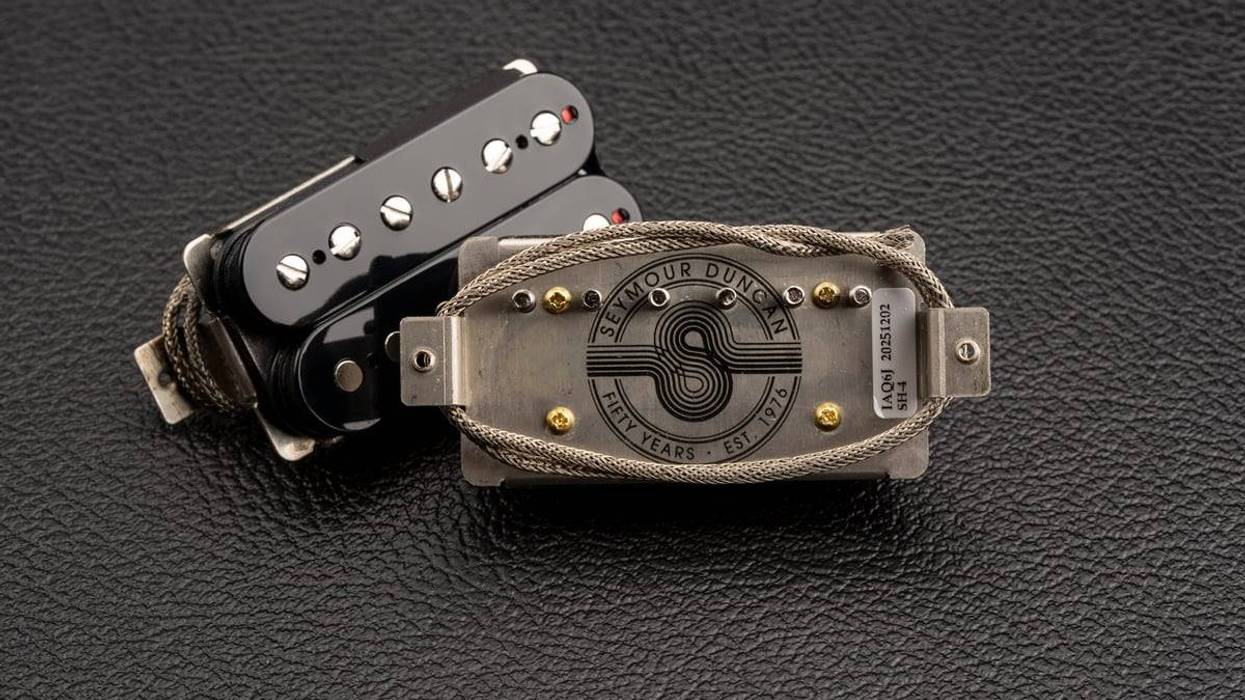Since industry veteran Joe Naylor founded the company in 1996, Reverend Guitars have produced some of the most distinctive guitars of the past two decades. Their unique vintage-with-a-contemporary-twist looks and sound have attracted the attention of players such as Billy Corgan, Bob Balch, and Unknown Hinson—who the company eventually worked with to develop a signature model. Affordability has also long been a key ingredient in the Reverend recipe, and their Sensei line was developed to provide guitarists with a high-quality, dependable guitar at a reasonable price. Now the company is setting its sights on players who desire a little more iron in their metal with the introduction of the stripped down and hot-rodded Sensei RA.
A Lesson In Tone
The Korean-made RA is basically a variation of Reverend's Sensei series that's targeted at rockers with heavier styles. It looks a little like the Sensei 290, and is made up of solid korina wood with a three-piece, medium oval-shaped korina set neck which is topped with an ebony fretboard with 22 medium jumbo frets, graphite nut, and pearloid block inlays. The streamlined look is highlighted by its single-layer binding and classy satin black finish, and is available in either wine red or black. Our wine red model had a flawless finish job, with a slight transparency in the top coat that reveals some of the korina's grain.
The RA's electronics are the real game changer that set it apart from the rest of the Sensei line. It's the first production guitar to feature Railhammer brand pickups, designed by industry veteran and Reverend founder Joe Naylor. The patent-pending design uses both rounded-profile rails and cylindrical pole pieces to produce fatter tones on the high strings, while keeping the more guttural tones produced by the lower strings tighter and more percussive. They’re also pretty eye-catching. The RA is loaded with their Chisel models—which are powered by ceramic magnets and wound to produce extra punch in the upper midrange to cut through the mix with more precision—and are entirely passive, with outputs of 7.5k and 13.0k in the neck and bridge, respectively.
The guitar's controls make it a pretty versatile beast. A three-way switch and Reverend's signature custom-tapered Volume and Tone controls handle the tonal shaping of the pickups, along with a Bass Contour knob that effectively rounds off the guitar's low end frequencies—much in the same way that a conventional tone knob pulls back the highs.
The Student Becomes the Master
Everything about the Sensei RA radiates affordable refinement, right down to the fit, finish, feel, and tone. The pickups' tones covered a pretty wide variety of musical styles, although with a sharper edge and more front-and-center tonal qualities that aren't usually a part of warm, more vintage humbucking tones.
While running clean with a '65 Fender Twin Reverb reissue, the Sensei RA's bridge humbucker was powerful—loaded with rich mids, taut highs, and a lot of low end. It’s surprising to hear that much low end you can get from the Twin's open-back cabinet, which is really designed for more high end-friendly tones. The guitar's Bass Contour control at max opens up the pickup's low frequencies to almost ridiculous levels, but it was easy to pull back and tune the guitar's low end response with the amp to my liking. And as I lowered it even further, the lows gradually disappeared and revealed the pickup's striking highs and upper midrange—showing off the pickup's impressive range for jazz, funk, and country coverage.
Ratings
Pros:
Bass Contour control offers a great variety of tones. Great build quality. Tight lows and blooming high end offer the best of both worlds.
Cons:
Sharp and aggressive nature of the Chisel pickups can be difficult to reign in.
Tones:
Playability:
Build:
Value:
Street:
$899.99
Reverend Guitars
reverendguitars.com
The bridge pickup lived up to its potential as well—keeping the lows tight without choking their sustain and allowing the high end to breathe and expand with varied levels of pick attack and bending. Switching to the neck pickup and picking jazz chords with an yielded similar results, but thankfully the pickup reacted to the more percussive style by giving more of a bite on the high B and G strings. It’s pretty difficult to dial out all the immediacy of the attack and the relative sharpness of the top end without losing a little high-end clarity. And I chalked this up to the ceramic magnets powering the pickups, which tend to give a stronger, more focused set of tones. But for picking arpeggiated progressions that demand a strong snap in the highs with plenty of detail, like Andy Summers and Adrian Belew, their performance was outstanding.
To test the Sensei RA's modern rock leanings, I warmed up a 2011 Mesa/Boogie Multi-Watt Dual Rectifier. The Mesa's second channel roared in drop-D tuning—staying airtight and extremely focused. This particular Recto has a fairly taut low end, but I had rarely heard it sound so mean and cutting before. The guitar's Bass Contour control was still at a pretty low setting—only about 1/4 of the way up—so bringing it up, the Mesa's characteristic low frequency fullness started to come into play. Moving past the control's halfway point started to smother the lows and mids a bit. And quickly switching playing gears between fast, Exodus-style thrash to grungier tones with fatter lows was only a matter of keeping my pinky finger at the ready for when I needed to perform a quick adjustment of the knob.
The Verdict
Reverend's Sensei series has developed over time to cover everything from rockabilly, classic rock, jazz and country, and the Sensei RA now fits the needs of modern rock and metal quite well. The Railhammer Chisel pickups are a great pairing, but if you're turned off by the aggressive nature of ceramic magnets, they might not be your bag. Still, its great build quality and highly intuitive Bass Contour control make it a must-try for the modern player on a budget who's looking for something a little out of the ordinary.
Watch our video review:


















